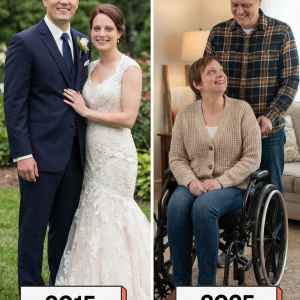Atlanta’s July sun beat down so fiercely the interstate seemed to ripple. In the wavering heat, a jet‑black Aston Martin idled on the shoulder, its hood propped up, white steam curling into the blue sky.
Beside it paced Elijah Brooks—38, impeccably dressed, and visibly unraveling. His navy suit clung to him in the heat, and every glance at his dead phone reminded him he had a board meeting downtown in less than an hour.
The whine of passing traffic was broken by the slow growl of an old red Ford F‑150 easing in behind him. Its faded paint and dented door looked battle‑tested, yet the truck rumbled with steady confidence.
Out hopped a woman in worn jeans, scuffed boots, and a tank top streaked with grease. She shaded her eyes, sizing up Elijah’s predicament with a cool, mechanic’s calm.
“You good, sir?” she called.
“Signal’s dead, radiator’s worse,” Elijah sighed.
She nodded toward the hood. “Mind popping it again?”
Within moments she diagnosed a leaky water pump and a serpentine belt on its last breath. “Name’s Amara,” she added, fishing a toolbox from the truck bed.
Elijah watched, half‑awed, half‑bewildered, as she spliced a hose, topped off coolant, and cinched a temporary fix. “Grew up in my dad’s garage,” she explained. “Now it’s mine.”
While she worked, sunlight caught a delicate gold band on her left hand—an emerald framed by intricate scrollwork. The ring looked almost antique.
“That ring… where’s it from?” Elijah asked.
“Mom’s,” Amara said softly. “Told me it was older than sin and never to pawn it.”
A memory pricked Elijah: his grandfather’s photograph of a forbidden love—and a ring just like this.
Amara slammed the hood. “You’re road‑worthy—for now.”
He exhaled. “I owe you.”
“Just keep it under 220°,” she joked, handing him a business card: Amara’s Auto—Southside Atlanta. Her last name—Wells—hit him like a drumbeat.
The Next Day
Curiosity—and something deeper—drove Elijah past glass towers and trendy cafés into the Southside, where Amara’s bright‑blue shop buzzed with engines and soul music.
In Bay 2, Amara wiped her hands as Elijah approached. “Car didn’t melt already, did it?”
“Not the car,” he said. “My family history.”
He spoke his grandfather’s name—Howard Brooks—and the story of Delilah Wells, the brilliant teacher he’d loved in the early ’60s until bigotry tore them apart. Delilah vanished, taking only the emerald ring.
Amara’s face tightened. “My mom was Jasmine Wells. She said her father never showed.”
Elijah slipped a brittle photo from his jacket: young Howard beside radiant Delilah—wearing that ring.
Amara’s breath caught. “That’s my grandma.”
“And my grandpa,” Elijah whispered. “We’re family.”
Silence swelled, broken only by the rhythmic thump of a shop compressor.
“I grew up thinking we started from scratch,” Amara murmured. “Mom hustled three jobs to build this place.”
Elijah’s voice cracked. “Grandpa died believing Delilah just disappeared.”
They didn’t hug; grease and suits don’t mix. But the look they shared felt generations deep.
Months Later
With Elijah’s capital and Amara’s know‑how, the garage blossomed into Wells & Brooks Auto Academy, a training haven for women of color chasing careers under the hood.
News outlets loved the “highway miracle.” Cameras captured the ribbon‑cutting, but they missed the quieter victory: two branches of a fractured family welding themselves back together.
And the ring? It no longer mourned a love forbidden. It gleamed on Amara’s finger as a promise—that legacy can outlive prejudice, and sometimes fate needs nothing more dramatic than a flat tire to set things right.





